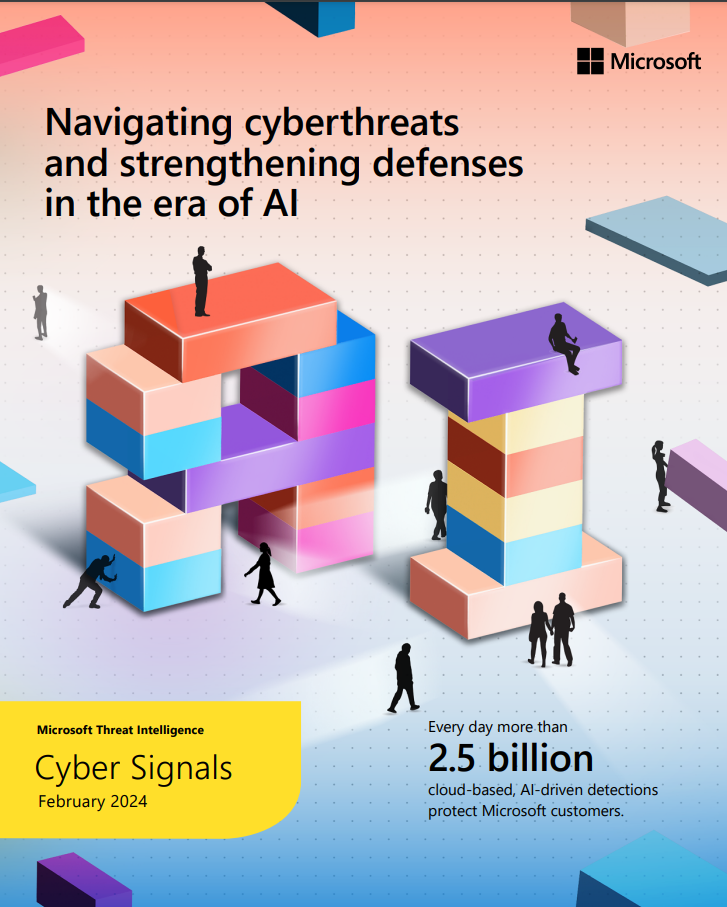|
The digital age has been a revolution for creative expression. Millions leverage powerful generative AI tools to turn ideas into reality. However, as Microsoft and other tech giants introduce these tools, safeguarding them from misuse becomes a pressing concern.
History teaches us that innovation can have a dark side. Tools become weapons, and this pattern repeats with AI. Malicious actors exploit these new tools for deepfakes (AI-generated video, audio, and images). This trend threatens elections, fosters financial fraud, enables harassment, and fuels cyberbullying. Immediate action is required. Fortunately, we can learn from past experiences in cybersecurity, election security, combating online extremism, and child protection. Microsoft champions a comprehensive approach focused on six key areas to safeguard individuals and communities: Robust Security Architecture: Microsoft prioritizes safety by design. This involves a multi-layered technical approach encompassing AI platforms, models, and applications. Features include red team analysis (simulated attacks to expose vulnerabilities), preemptive content blockers, abusive prompt blocking, automated testing, and swift bans for system abusers. Data analysis plays a crucial role in this architecture. Microsoft offers a strong foundation through its Responsible AI and Digital Safety Standards, but continuous innovation is necessary as technology evolves. Enduring Media Provenance and Watermarking: This is the key to combating deepfakes. At Build 2023, Microsoft unveiled media provenance capabilities that utilize cryptographic methods to embed metadata within AI-generated content, tracing its source and history. Microsoft collaborates with industry leaders in R&D for provenance authentication methods, co-founding Project Origin and the Coalition for Content Provenance and Authenticity (C2PA). Recently, Google and Meta joined C2PA, a step Microsoft applauds. Microsoft is already integrating provenance technology into its image creation tools (Bing's Microsoft Designer and Copilot). Expanding media provenance across all image creation and manipulation tools is underway. Additionally, Microsoft actively explores watermarking and fingerprinting techniques to bolster provenance. Ultimately, users deserve the ability to quickly discern if an image or video is AI-generated or manipulated. Guarding Services from Abusive Content and Conduct: While freedom of expression is valued, it shouldn't shield individuals who use AI-generated voices to defraud others. It shouldn't protect deceptive deepfakes that sway public opinion or empower cyberbullies and distributors of nonconsensual pornography. Microsoft is committed to identifying and removing such deceptive and abusive content from its consumer services like LinkedIn, the Gaming network, and others. Industry-Wide Collaboration with Governments and Civil Society: While individual companies bear responsibility for their products, collaboration fosters a safer digital ecosystem. Microsoft seeks to work closely with others in the tech sector, especially within the generative AI and social media spheres. Proactive efforts with civil society groups and collaboration with governments are also crucial. Drawing on experiences combating online extremism (Christchurch Call), collaborating with law enforcement (Digital Crimes Unit), and protecting children (WeProtect Global Alliance), Microsoft is committed to spearheading new initiatives across the tech sector and with other stakeholders. Modernized Legislation for Public Protection: Addressing these new threats potentially necessitates new legislation and law enforcement efforts. Microsoft looks forward to contributing ideas and supporting governments' initiatives to enhance online protection while upholding core values like free speech and privacy. Public Awareness and Education: A well-informed public is our strongest defense. Just as we've learned to be skeptical of online information, we need to develop the ability to discern legitimate from AI-generated content. Public education tools and programs, developed in collaboration with civil society and leaders, are essential. In combating malicious AI-generated content, continuous effort and collaboration are essential. By prioritizing innovation and collaboration, we can ensure that technology, including Microsoft Dynamics Solutions in Saudi Arabia, empowers rather than endangers the public.
0 Comments
The cybersecurity landscape is experiencing a profound shift. Artificial Intelligence (AI) is leading this evolution, offering organizations unprecedented capabilities to thwart cyber threats at unprecedented speeds, overcome shortages in cybersecurity talent, and foster innovation and operational efficiencies. However, the same technology poses risks as malicious entities could potentially harness AI to enhance their malicious endeavors. It’s increasingly vital to safeguard our digital environments with AI, as well as to ensure the security of AI technologies themselves.
The latest release, the sixth edition of Cyber Signals, highlights our efforts to secure AI platforms against newly emerging threats from nation-state cyber actors. In partnership with OpenAI, we provide insights into state-linked threat groups monitored by Microsoft, such as Forest Blizzard, Emerald Sleet, Crimson Sandstorm, Charcoal Typhoon, and Salmon Typhoon. These groups have attempted to leverage large language models (LLMs) to boost their cyber operations. This crucial research sheds light on the preliminary actions of these notorious actors concerning AI and our successful efforts to hinder their activities to safeguard AI platforms and their users. We are also proud to announce Microsoft’s foundational principles that shape our approach to mitigating risks posed by nation-state Advanced Persistent Threats, Advanced Persistent Manipulators, and cybercriminal networks utilizing AI platforms and APIs. These principles focus on the identification of and action against malicious actors, notification to other AI service providers, collaboration across various sectors, and maintaining transparency. Furthermore, Microsoft is committed to assisting the broader security community in recognizing and responding to the potential use of LLMs in cyber attacks. We continue our collaboration with MITRE to incorporate LLM-related tactics, techniques, and procedures (TTPs) into the MITRE ATT&CK® framework or the MITRE ATLAS™ (Adversarial Threat Landscape for Artificial-Intelligence Systems) knowledge base. This strategic initiative demonstrates our dedication to both track and neutralize threats and to lead in the development of defenses in the ever-evolving realm of AI-driven cyber operations. This edition of Cyber Signals delves into how threat actors are refining their strategies using AI, as well as how AI aids us in fortifying Microsoft’s defenses. Cybercriminals and state-backed actors are increasingly turning to AI, including LLMs, to enhance their operational efficiency and exploit platforms that support their tactics and objectives. While their motivations and levels of sophistication may differ, their operational strategies share commonalities. These include reconnaissance activities such as scouting potential victims’ industries and geographies; coding to enhance software scripts and malware; and leveraging assistance in mastering both human and machine languages. Our joint research with OpenAI has yet to pinpoint significant attacks employing the LLMs we closely monitor. Microsoft employs various strategies to shield itself from these cyber threats, including AI-driven threat detection that monitors changes in network resource usage or traffic; behavioral analytics to identify risky sign-ins and unusual activities; machine learning models for detecting risky sign-ins and malware; implementing a Zero Trust approach requiring full authentication, authorization, and encryption for every access request; and ensuring device health before allowing network connection. Moreover, generative AI holds immense promise in empowering defenders to protect their enterprises swiftly and efficiently. AI’s role in cybersecurity is expansive, driving both innovation and efficiency across numerous areas. From improving threat detection to streamlining incident responses, AI’s capabilities are transforming the cybersecurity domain. The application of LLMs in this field exemplifies the potential of AI, as these models process vast datasets to identify patterns and insights in cyber threats, thereby enriching threat intelligence. They also support technical operations like reverse engineering and malware analysis, adding a robust layer of defense against cyber threats. For instance, users of Microsoft Copilot for Security have noted a 44% improvement in task accuracy and a 26% reduction in task completion time. These statistics underscore the substantial benefits of integrating AI into cybersecurity measures. As we navigate the future of AI, it's crucial to recognize the dual aspects of technology—it introduces both novel capabilities and new risks. AI represents not just a tool but a paradigm shift in how we approach cybersecurity, empowering us to counter sophisticated cyber threats and adapt to the fluid threat landscape. By embracing AI, we contribute to securing a safer future for all. This past year witnessed a surge in technology excitement with the emergence of generative AI. Leaders across industries embraced the possibilities it offered for enhancing their operations. Many recognized the value of generative AI and are keen to continue innovating, while others are inspired by its potential and actively seek ways to integrate it. At Microsoft, our focus lies in developing responsible AI strategies anchored in pragmatic innovation and enabling enterprise resource planning (ERP) optimization through AI Transformation for our customers.
Our discussions with customers and partners highlight the transformative outcomes they're experiencing. By aligning these outcomes with Microsoft's generative AI capabilities, we've identified four key areas of opportunity for organizations to unlock their AI Transformation journey:
Enriching Employee Experiences and Streamlining Workflows Microsoft's Copilot technology is demonstrating its transformative potential in employee experience and workflow optimization. Bayer employees are collaborating seamlessly on global research projects and experiencing significant time savings on daily tasks with Copilot for Microsoft 365. Similarly, Finnish company Elisa is leveraging Copilot to streamline routine tasks for knowledge workers across finance, sales, and customer service. In the financial services sector, Banreservas is boosting employee productivity and enhancing decision-making with Copilot, while Hong Kong's leading transportation companies, Cathay Pacific and MTR, are achieving workflow streamlining, improved communication, and reduced administrative burdens. Professional services are also witnessing significant benefits. KPMG has reported a 50% leap in employee productivity with Copilot integration. Dentsu employees are saving up to 30 minutes per day on creative visualization tasks, and EY is experiencing faster report generation and near real-time access to insights. Beyond these examples, Copilot empowers employees in various industries:
Revolutionizing Customer Interactions:
Revolutionizing Disaster Response:
As AI adoption rises, developing a clear strategy for leveraging AI to address critical business needs is crucial. Microsoft is committed to supporting its customers and partners in accelerating pragmatic AI innovation. From enriching employee experiences and reinventing customer engagement to reshaping business processes and accelerating innovation, Microsoft offers a comprehensive suite of AI solutions to empower your success. Why Choose Microsoft?
Throughout history, transformative tools have always ushered in significant changes. From ancient aqueducts that transported water over vast distances to smartphones that place global information at our fingertips, these tools have reshaped our lives. Today, we stand on the brink of another monumental shift with the advent of artificial intelligence (AI).
This transformation isn't a distant future event; it is unfolding now, presenting an immediate opportunity to lead in this groundbreaking era of AI. This exciting transition promises to be one of the most significant in our time, and its effects are only beginning to manifest. We foresee this transformation impacting three critical dimensions: individuals, business functions, and entire industries. Enhancing Individual Productivity Through AIAI is redefining personal interactions with technology, making our natural language a key to unlocking significant value. Think of AI as a copilot in your daily tasks, enhancing creativity and speeding up outcomes. This AI copilot, while powerful, remains under the user's control—it complements rather than replaces human effort. Users direct and refine the output it generates. We recently unveiled Microsoft Copilot, designed to be a digital life companion. At work, Microsoft 365 Copilot integrates with your calendar, emails, chats, documents, meetings, and more. Already in use by tens of thousands in our Early Access Program—including major companies like Visa, General Motors, KPMG, and Lumen Technologies—Microsoft 365 Copilot will be widely available starting November 1, 2023. Productivity takes on a new form for developers with GitHub Copilot, which offers in-line coding suggestions simply from natural language descriptions. At General Motors, developers leverage GitHub Copilot to quickly integrate and collaborate, reducing the time spent on basic coding tasks and focusing more on valuable contributions. Navigating Data Overload with AIIn our data-saturated world, AI provides a crucial function by simplifying how we process vast amounts of information. Instead of being bogged down by the minutiae of daily tasks—like recapping meetings, managing emails, or locating documents—AI allows us to concentrate on the essence of our work. The effective use of AI augments human capabilities and accelerates our innate creativity. For individuals, AI paves the way for enhanced creativity, ensuring that human intellect is dedicated to innovation and strategic thinking. Transforming Business Roles and Functions with AILeaders across various sectors are consistently striving to enhance core business functions. Their goals often include reducing costs, boosting efficiency, modernizing operations, increasing top-line revenue, and achieving market expansion. Today, AI serves as a powerful catalyst, accelerating these desired outcomes across diverse business roles and functions. For instance, in the realm of sales, leaders face distinct challenges such as optimizing time spent with customers, maintaining data quality and pipeline hygiene, and shortening sales cycles to accelerate revenue generation. Traditional sales technologies, often mired in manual and disjointed processes involving emails, spreadsheets, and CRM software, can hinder these efforts. It's reported that 78 percent of sales professionals would welcome AI assistance to simplify their daily tasks. Enhancing Sales Efficiency with Microsoft Sales CopilotMicrosoft Sales Copilot is making significant strides in transforming the sales process. Companies like the global security services provider Securitas are witnessing its impact firsthand, where sales teams can now dedicate more time to customer engagement rather than mundane tasks like data entry. Philip Eklund, Vice President of Client Engagement Platform at Securitas, praises the Microsoft Sales Copilot for its ability to save valuable time for sales personnel. AI's Pivotal Role in SecurityIn the field of security, AI is a game-changer, shifting from defensive postures to proactive strategies that learn from the environment and adapt quicker than evolving threats. Bridgewater, an asset management firm and early adopter of Microsoft Security Copilot, predicts that by December 2024, security operations as known in 2021 will seem almost archaic. Redefining Industry Standards with AIEvery industry, from energy to financial services and manufacturing, faces unique challenges and opportunities. The impact of generative AI varies greatly among these sectors, but its potential to revolutionize is uniformly significant. AI Innovations in HealthcareIn healthcare, AI is poised to transform care delivery through personalized patient experiences and enhance the productivity and efficiency of care providers, addressing issues such as clinician burnout. Microsoft's partnerships, such as with Epic, integrate AI solutions like Microsoft Azure OpenAI Service and Nuance DAX Copilot, dramatically easing the administrative load on clinicians and allowing them to focus more on patient care. Revolutionizing Retail with AIIn the retail sector, McKinsey predicts that generative AI could potentially generate up to $660 billion annually through increased revenue, enhanced customer loyalty, and improved operational efficiencies. This transformation is manifesting in more personalized shopping experiences, advanced analytics, improved customer service, and supply chain efficiencies. For example, Choice Market utilizes Microsoft Cloud for Retail to gain deeper insights into customer preferences, effectively positioning products like their popular breakfast burrito to meet consumer demand optimally. The application of AI across various industries is not just enhancing current practices but is paving the way for innovative approaches that redefine what is possible. Our Commitment to Responsible AI and Shaping the Future CollaborativelyAs we enhance individual productivity, redefine success across various roles and functions, and forge new pathways for diverse industries, the importance of AI safety cannot be understated—it is essential, not optional. Microsoft is dedicated to the principles of responsible AI. This commitment means developing, evaluating, deploying, and utilizing AI technologies in ways that are consistent with human values and do not harm individuals, communities, or broader society. We are eager to share our experiences and insights from our own AI developments, providing tools and resources that assist our customers in adopting AI responsibly within their organizations. Supporting Your AI JourneyAs you navigate this transformative era, Microsoft pledges comprehensive support through guidance, resources, and information to aid your journey. We have collaborated with customers, industry experts, and Microsoft executives to pinpoint five key factors crucial for AI success, which we believe are imperative for organizations aiming to leverage AI effectively. Additionally, we provide examples of leading use cases that have had a significant impact across various sectors, offering a source of inspiration for initiating your AI endeavors. The potential that lies before us in this new era of AI is immense and represents one of the most profound shifts of our time. We are thrilled about the opportunity to collaborate with you as we embark on this exciting journey together. Real Madrid Football Club stands out among the world's premier sports franchises, boasting a colossal fan base of 500 million supporters worldwide. However, with only a fraction of these fans situated in Spain, the club sought a method to connect with its global audience and nurture their fervent club allegiance, regardless of their geographical location. To tackle this challenge head-on, Real Madrid enlisted the expertise of a Microsoft Services team to conceptualize, develop, and roll out a comprehensive global digital sports platform. Leveraging an array of Microsoft cloud services, this platform taps into the expansive reach of Microsoft's cloud infrastructure to consistently deliver an unparalleled fan experience on a global scale. Real Madrid can now engage with fans on a personalized level, execute targeted promotional initiatives, and harness data insights to monitor and analyze fan behaviors, among a host of other functionalities. Today, the club reports a remarkable 30 percent growth in digital revenue, underscoring its optimistic outlook on the digital future of the organization.
Undoubtedly, Real Madrid Football Club reigns supreme as the pinnacle of the sports world, buoyed by its legion of fervent fans across the globe. Established in 1902, the club boasts an illustrious track record, clinching over 100 championships, including an impressive 12 European Cups, two FIFA Club World Cups, and three Intercontinental Cups. FIFA's recognition of Real Madrid as the premier football club of the 20th century further underscores its unparalleled legacy. Across the globe, fans exhibit an unwavering devotion to the team, closely monitoring its performance and players with unbridled passion. However, until recently, the club's ability to engage with its extensive fan base was largely confined to attendees at the Santiago Bernabéu Stadium, visitors to its website, or participants in its social media channels. Recognizing the potential of a digital transformation to revolutionize fan engagement, Real Madrid embarked on a quest to identify a technology leader capable of guiding the club through this pivotal digital journey, ultimately forging a strategic partnership with Microsoft. Pioneering a Digital Transformation Journey ligned with Microsoft Services' tested strategy, the inaugural action involved gathering the key stakeholders from the club to discuss their requirements and, importantly, to define their vision for enhancing fan engagement. "Our goal was to establish connections with Real Madrid supporters globally," states José Ángel Sánchez, the CEO of Real Madrid, highlighting that nearly 97 percent of the club's fans are based outside Spain. "It's imperative for us to comprehend and glean insights from them since they are the true owners of the club." This initial phase commenced with a meeting at the Microsoft Executive Briefing Center located in Redmond, Washington. Here, Microsoft Services orchestrated a brainstorming session that deliberately omitted technology-focused discussions. The aim was to freely explore the potential impacts of the club's digital transformation and the objectives it sought to fulfill. "The majority of our discussion revolved around the business benefits of enhancing our fan engagement levels and exploring various avenues to achieve this," mentions Sánchez. "Despite Microsoft Services being composed of technology aficionados, they prioritized articulating and aligning our business objectives. This was not just to grasp these goals but to ensure a unified understanding and agreement on these aims among all stakeholders." With the business objectives of Real Madrid clearly in focus, the subsequent step for the Microsoft Services team was to delineate a strategic project outline. This blueprint would steer the creation of a Real Madrid digital sports platform with international scope – a critical feature given the global dispersion of its fan base. Notably, the biggest market, Indonesia, represents just 11 percent of the fan base and is located a significant distance from Spain. Given the diverse and widespread nature of Real Madrid's supporters, the club recognized that there wasn't a "one-size-fits-all" fan profile. Therefore, capturing and analyzing fan behavior data would be crucial for the project's success. Integrating Technology for Enhanced EngagementIn collaboration with Real Madrid, Microsoft Services developed an extensive platform-as-a-service (PaaS) architecture, leveraging a broad spectrum of Microsoft cloud solutions. This suite included technologies from Microsoft Azure, as well as Microsoft Dynamics 365, Office 365, and Power BI. The development utilized the .NET Framework alongside Visual Studio 2013 and Azure DevOps (previously known as Visual Studio Team Services), indicating the project's extensive scope. Around 50 members from the Microsoft Services team formed the core project team, with an additional 150 Microsoft experts contributing in areas such as data science and app development. Enrique Uriel, CIO of Real Madrid, emphasizes the club's primary focus on football and the importance of having Microsoft manage the technological framework. "Microsoft's Azure platform is crucial for us. It enables us to deliver the services our fans expect by providing the global scalability required on demand," he remarks. The implementation of a PaaS solution utilizing Microsoft Azure and other Microsoft cloud technologies afforded Real Madrid the necessary worldwide reach. Moreover, it alleviated the club's IT department from the complexities of maintaining the advanced infrastructure demanded by its digital sports platform. Consequently, the club was able to expand its digital services team rather than increase its IT personnel. Rafael de Los Santos, the leader of the club’s digital initiatives, notes the rapid growth of their digital team, which expanded from five to over thirty members, including data scientists, within just a year. "Thanks to Microsoft's cloud-based service delivery platform, we can shift our focus from managing infrastructure to improving fan engagement and achieving better business results," he states. Bridging the Gap with Global FansThe digital sports platform created for Real Madrid by Microsoft Services is now fully functional, providing enriched content and leveraging advanced analytics for deep insights into fan behaviors. This platform comprises four key elements: Fan Engagement Engine: At the heart of Real Madrid's marketing efforts, this component records every fan interaction, from mobile check-ins at the stadium to updates on the club's website and online merchandise purchases. It harnesses features from Microsoft Office 365, Dynamics 365, and Power BI, alongside Microsoft Social Engagement for tracking mentions and data from major social networks. The bulk of data is stored in Azure Table Storage, with Azure Cosmos DB supporting swift, high-performance data queries for analysis. Video Expansion Service: Leveraging Azure Media Services along with Azure App Service and Azure Media Player, this service allows the delivery of both recent and archival video content, including historical matches. Azure Search provides fans the ability to look up specific matches using various filters. For live games, it offers the option to select different camera angles to replay significant moments and player actions. Interactive Fan App: A hit across iOS, Android, and Windows platforms, Real Madrid's mobile app connects fans worldwide to club content. It offers virtual stadium access around game times, detailed information on current and former players, and comprehensive club stats. Azure Active Directory B2C handles secure user authentication and profile management. Fans can sign in through social media platforms like Facebook or use traditional login methods, ensuring a consistent user experience across devices while addressing security and scalability concerns. Data-Driven Digital Evolution: According to Begoña Sanz, Real Madrid’s commercial general manager, the club's digital shift is propelled by data. These foundational elements have markedly accelerated the club's digital transformation. "Our goal is to gather as much data on our fans as possible to tailor our interactions across all touchpoints," he remarks. "Previously, our data came from around five sources. Now, leveraging our Microsoft cloud platform, we draw from over 70 sources. This approach has expanded our fan profile database by approximately 400% in two years, now reaching into the millions." Expanding Digital Earnings by 30 PercentSánchez expresses immense satisfaction with the outcomes achieved through the partnership with Microsoft Services, emphasizing how the digital transformation initiative has enhanced the club's connection with its supporters. He attributes the project's success to the expertise, project management, effective communication, and swift responses from Microsoft Services, alongside their commitment to leveraging Microsoft's extensive resources for the Real Madrid initiative. The digital sports platform has not only fostered deeper connections with fans but also unlocked new revenue channels for the club, Sánchez observes. "Leveraging the Microsoft Cloud, we've developed an understanding of our fans' identities, locations, and desires," he states. "This knowledge allows us to devise a personalized communication strategy for each fan, regardless of their location. The capabilities of our digital sports platform are influencing every aspect of our operations, including our digital revenue, which is seeing a yearly growth of 30 percent compared to our past digital endeavors. The return on this investment has been tremendous, positioning us for a promising future." Airbus Soars with Innovation: Azure Powers Pilot Training, Maintenance, and Secure Solutions3/23/2024 Airbus, a pioneer in aerospace, continuously strives for innovation. They cater to complex needs of their defense and aerospace clients with cutting-edge solutions. Their latest advancements leverage Azure AI to revolutionize pilot training and anticipate aircraft maintenance issues. Additionally, Airbus utilizes containers to deliver air-gapped solutions, a necessity for their most stringently regulated customers.
Why Microsoft Azure? According to Airbus, only Microsoft offered the ideal combination: proven, cutting-edge AI technologies trained on massive datasets, readily available in a fully disconnected environment. This capability, absent with other ERP vendors, significantly accelerates their time to market – a key differentiator for them. Airbus: A Legacy of Innovation Airbus boasts a proud 50-year history of European aerospace innovation. They are a leading producer of aircraft (commercial and military), helicopters, launch vehicles, and satellites. Additionally, they deliver navigation, secure communication, and data services to clients worldwide. Microsoft Azure: The Perfect Partner for Diverse Needs When faced with two distinct use cases, Airbus identified Microsoft Azure technologies, particularly Azure Cognitive Services, as the optimal solution. This partnership allows Airbus to continue pushing technical boundaries, paving the way for a safer, more connected, and prosperous world. The Takeaway: Innovation Beyond Traditional ERP While ERP vendors play a crucial role in business operations, Airbus' story showcases the transformative power of specialized AI solutions. By embracing cutting-edge technologies like Azure Cognitive Services, companies can achieve breakthroughs beyond the scope of traditional ERP offerings. Airbus Takes Flight with Secure AI Solutions: Why Traditional ERP Systems Fall ShortAirbus Navigates Complex Security Challenges for Cutting-Edge Innovation While popular ERP systems offer essential functionalities, they often struggle to meet the stringent security demands of highly regulated industries. This is precisely the challenge faced by Airbus, a leader in aerospace, as they strive to deliver advanced AI solutions for their defense and government clients. Data Sovereignty and Regulations: A Barrier to Innovation Many Airbus customers, particularly those in the military and government sectors, adhere to strict regulations that restrict the use of public clouds. Data nationalization rules further complicate matters, mandating non-public cloud solutions for certain countries. Additionally, collaborations with organizations like NATO come with their own set of regulations. "The sheer number of regulations we have to navigate, especially in Europe where individual countries often have their own rules, creates a significant hurdle when trying to implement modern services within this environment," explains Marcel Rummens, Product Owner of Internal AI Platform at Airbus. Microsoft Azure: The Key to Secure Innovation Airbus partnered with Microsoft to create a secure, restricted cloud environment that complies with data sovereignty regulations. This platform leverages Azure AI solutions, offering the company a distinct advantage. "Only Microsoft provided the proven, cutting-edge AI technologies and large-scale training datasets we needed," says Rummens. "Furthermore, Microsoft offers these technologies in a disconnected mode, separate from the public cloud. This combination significantly accelerates our time to market and has been a key differentiator for us." The Takeaway: Beyond Traditional ERP This case study by Airbus highlights the limitations of popular ERP systems in addressing specialized security needs. By embracing innovative solutions like secure cloud platforms and advanced AI technologies, companies can push the boundaries of innovation and achieve success even within highly regulated environments. Airbus Soars with AI Chatbots: Revolutionizing Pilot Training (While Keeping Sensitive Data Secure)Traditional pilot training with its hefty manuals and intensive courses can be a time-consuming hurdle. As aircraft technology advances, the training burden grows – Airbus A330 pilots, for example, must master over 6,000 pages of material! Airbus Takes Off with AI To bridge the gap between initial training and refresher courses, Airbus developed a pilot training chatbot. Accessible from mobile devices, this chatbot allows pilots to ask questions and receive instant spoken answers, acting as a virtual "on-call instructor" available 24/7. Benefits Beyond Millennials Peter Walker, Project Lead for the Airbus A330 Pilot Training Chatbot, highlights the chatbot's appeal: "It's perfect for digital natives, but everyone appreciates not lugging around heavy manuals." Secure Innovation for Military Applications Airbus also created chatbots for military aircraft. However, these required secure, disconnected deployment due to data sensitivity. The solution? Speech containers within Airbus's private, restricted cloud environment using Microsoft Azure Cognitive Services. Microsoft Azure: A Seamless Integration Stephen Gerard King, Data Analytics and Applications Analyst at Airbus, explains, "The Microsoft Speech SDK made integrating speech functionality quick and easy. The Microsoft team's responsiveness was invaluable." The Takeaway: Beyond Traditional Training This Airbus case study showcases how AI chatbots can revolutionize pilot training, improving efficiency and accessibility. Additionally, it emphasizes the importance of secure solutions like restricted cloud environments for sensitive data. While popular ERP systems may not address these specialized needs, innovative AI solutions pave the way for a future of secure and efficient training across various industries. Airbus Takes Flight with Predictive Maintenance: How AI Safeguards Military Aircraft (While Keeping Data Secure)The Challenge: Maintaining Peak Performance for Military Aircraft Military aircraft operate in demanding environments, enduring harsh conditions and constant stress. Rapid temperature changes, high-altitude radiation, and everyday wear and tear can all impact aircraft readiness. Predicting and preventing potential problems is crucial. AI Steps Up: Early Warning with Anomaly Detection Airbus leverages Microsoft Azure Cognitive Services' Anomaly Detector to address this challenge. This AI technology gathers and analyzes aircraft telemetry data, identifying anomalies that could signal potential issues. Faster Deployment with Pre-Trained Models "For simpler cases," explains Marcel Rummens, Product Owner of Internal AI Platform at Airbus, "Anomaly Detector's out-of-the-box solution works beautifully. This saves us development time, especially for smaller use cases – up to three months faster deployment!" For complex situations, custom algorithms might be needed. Disconnected Solutions for Secure Military Applications Airbus prioritizes data security. Therefore, they deploy Anomaly Detector in secure containers within their restricted cloud environment. This ensures sensitive data remains protected. Looking Ahead: Breaking Language Barriers The Airbus team is exploring Microsoft Cognitive Services' translation APIs. This will facilitate communication and collaboration between diverse teams using Airbus systems, especially on high-security projects where web-based translators aren't an option. The Benefits of Trustworthy Technology "The Microsoft solutions just work," says Rummens, praising the reliability and disconnected deployment options. "New services are constantly added, and existing ones are regularly updated." Stephen Gerard King, Data Analytics and Applications Analyst at Airbus, agrees: "These user-friendly cloud APIs offer a fast and secure way to deploy proof-of-concept solutions in our disconnected environment." The Takeaway: Secure, Scalable AI for the Future Airbus' collaboration with Microsoft showcases the transformative power of AI in safeguarding military aircraft. Furthermore, it highlights the importance of secure, disconnected solutions for highly regulated industries. By embracing innovative AI tools, Airbus paves the way for a future of predictive maintenance, ensuring the operational readiness of their aircraft while maintaining essential data security. The NBA’s Data-Driven Revolution: Fan Engagement and On-Court Strategy with Microsoft Azure3/23/2024 When the final buzzer sounds at an NBA game, signaling the end of play on the court. Because in reality, a new era is just beginning, as clubs are formulating data-driven strategies to prepare for the next match. Microsoft Azure brings these rivals together for fans and teams like never before, allowing them to take a look behind the curtain. In December 2020, Azure introduced NBA CourtOptix, which uses machine learning and artificial intelligence in the cloud to analyze player action, offer fans a lowdown of every shot and pass, and provide certain of the cunning that underpins the greatest plays in league history..drawImage-Swisscom
But the impact goes beyond fan engagement. The NBA is now collaborating with its teams to integrate data through Azure into existing player tracking resources. This empowers coaches with a more comprehensive picture of on-court performance, enabling them to devise more effective game strategies. Unveiling the Hidden Heroes of Defense Traditionally, analyzing defensive performance in the NBA has been a challenge. Unlike sports with defined plays and limited participants, basketball's fluid nature makes it difficult to track individual contributions. NBA CourtOptix tackles this challenge head-on. A sophisticated camera system captures player movements throughout the game, generating a staggering 10 million data points per game. This data is then analyzed in the cloud using Microsoft Azure's powerful AI and ML capabilities. The resulting insights are transforming the game for both fans and players alike. Microsoft Dynamics solutions in Saudi Arabia can offer similar data-driven advantages to businesses across various industries. Unveiling the Hidden Heroes: How AI and Azure Empower NBA Defense (and How Your Business Can Benefit) The ability to evaluate a player's defensive contribution has long been a challenge in basketball. "There's no good way," says Sydney Sarachek, Director of Stats Technology Product Development at the NBA. "We've made it a priority to change that." Unlocking Defensive Insights with AI The NBA has partnered with Microsoft Azure to leverage the power of AI and machine learning (ML). By analyzing player tracking data, they've developed innovative algorithms that quantify defensive performance. These algorithms consider various factors like denying passing lanes and positioning relative to the offensive player. The result? A score reflecting the defensive pressure each player applies throughout the game. Microsoft Azure: The Engine Behind the Insights "We use a variety of AI and machine-learning techniques on Azure to identify defensive matchup responsibilities," explains Sarachek. This empowers teams with a new level of understanding, allowing them to devise more effective defensive strategies. Microsoft Dynamics solutions in Saudi Arabia offer similar data-driven advantages, helping businesses across industries gain deeper insights and optimize processes. Cloud Powering Personalized Data Delivery Initially launched in 2020, NBA CourtOptix focused on fan experience with post-game analysis. Now, with Microsoft Azure, the platform goes beyond. Advanced statistics are shared with journalists, teams, and employees, enriching the game for everyone. Real-Time Data for Real-Time Adjustments Every game night, teams receive a detailed data breakdown that transforms strategies. This seamless data flow is facilitated by Microsoft Azure developers. Here's how it works:
The Takeaway: Data-Driven Success The NBA's story is a testament to the power of AI and cloud technology. Microsoft Dynamics solutions in Saudi Arabia can equip businesses with similar tools to unlock hidden insights, optimize performance, and achieve success. Effortless Data Sharing through Azure "Sarachek highlights how Azure Data Share simplifies the data distribution process. By simply sending an invite via the Azure console, new teams or partners can access the latest data directly in their Azure environment, eliminating the need for complex data integration processes." Revolutionizing Data Management in Sports "When developing new metrics, the NBA faces the challenge of integrating extensive historical data to provide comprehensive insights. Utilizing Azure, the NBA now harnesses the power of over 1,000 virtual machines to process billions of data points in minutes, a task that previously took weeks, significantly enhancing efficiency and cost-effectiveness." A Strategic Move to Cloud-First Scalability "The NBA's transition to a cloud-first strategy, partnering with Azure, enables the league to dynamically scale computing resources. This capability is especially critical during live games, allowing for immediate adjustments without the need for constant, high-level investment in computational resources." Pioneering Real-Time Data for Enhanced Fan Experience "Looking ahead, the NBA anticipates transforming the basketball experience with real-time data analytics. By providing instant access to data for teams, fans, and broadcast partners, the league aims to enrich in-game analysis and fan engagement, leveraging the comprehensive infrastructure built on Azure." |
AuthorWrite something about yourself. No need to be fancy, just an overview. Archives
March 2024
Categories |
|
Saudi Arabia
PO Box 12831 2357, Al Malaz - Zaid Ibn Thabit street, Venicia Building, Riyadh, Saudi Arabia. |
United States4008 Louetta Rd
Spring, Texas 77388 USA |
Home
|
Request a demo
|








 RSS Feed
RSS Feed

